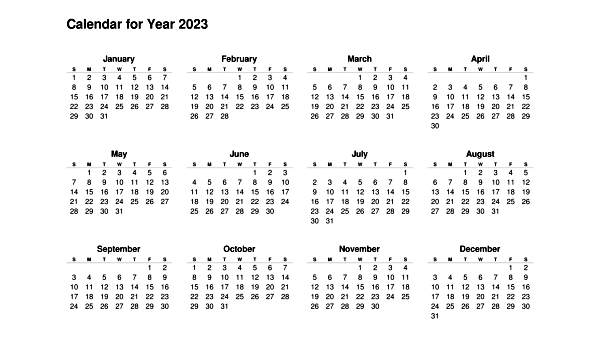Time, a concept that has intrigued and fascinated humans throughout the ages, is a fundamental aspect of our existence. The measurement of time is a crucial aspect of various civilizations and cultures, with one of the most basic units being the year. The question of how many days in a year might seem simple at first glance, but the answer delves into the realms of astronomy, mathematics, and the intricate workings of our solar system.
The Solar Year– How Many Days in a Year
The Earth orbits the Sun in what is known as a solar year, completing one full revolution approximately every 365.25 days. This orbital period is the basis for our calendar year, and it is what determines the changing seasons. The extra 0.25 days are why we have a leap year every four years.

The Gregorian Calendar
The Gregorian calendar, introduced by Pope Gregory XIII in October 1582, refined the existing Julian calendar. The Gregorian calendar aimed to bring the date of the spring equinox closer to March 21, aligning more accurately with the astronomical year.
Leap Years
To compensate for the 0.25-day discrepancy in the solar year, the leap year was introduced. A leap year is a year that is evenly divisible by 4, except for years that are divisible by 100. However, years divisible by 400 are still leap years. This adjustment keeps the calendar year synchronized with the astronomical year and prevents the gradual misalignment that would otherwise occur.
Historical Calendars
Before the advent of the Gregorian calendar, various cultures had their own ways of reckoning time. The ancient Egyptians used a calendar based on the annual rising of the star Sirius. The Mayans had a complex calendar system that included a solar year of 365 days. The Chinese lunar calendar, still in use for traditional holidays, How many days in a year is based on the Moon’s phases.
The Importance of Knowing the Length of a Year
Understanding the length of a year is not just an academic exercise; it has practical implications in various fields. Agriculture, for example, relies on the timing of seasons for planting and harvesting crops. Similarly, astronomers use the length of a year to predict celestial events such as eclipses and planetary movements.
The Anomalies
While the Earth’s orbit around the Sun is relatively stable, various factors can introduce minor irregularities. Gravitational interactions with other celestial bodies, such as the Moon and other planets, can influence the Earth’s orbit over long periods. These perturbations are taken into account in scientific calculations but are generally negligible in everyday considerations.
Other Planets, Other Years
The concept of a year is not exclusive to Earth; other planets in our solar system also experience their own orbital periods. For example, a year on Mars, known as a “Martian year,” is approximately 687 Earth days. The lengths of years on other planets vary depending on their distance from the Sun and their orbital characteristics.
Cultural Significance
The measurement of time, including the length of a year, has profound cultural and religious significance. Many religious observances and festivals are tied to the changing seasons, and the length of a year plays a crucial role in determining the dates of these celebrations. The solstices and equinoxes, marking key points in the solar year, have been revered in various cultures throughout history.
The Impact of Time Zones
The Earth is divided into time zones, each generally covering 15 degrees of longitude, to accommodate the Earth’s rotation and ensure a standardized measure of time worldwide. This system, first proposed by Sir Sandford Fleming in the late 19th century, enables efficient coordination in a world that operates 24/7. While time zones simplify global communication, they also highlight the dynamic nature of time as it unfolds across the planet.
Leap Seconds and Tidal Effects
Even with atomic precision, small adjustments are occasionally needed to keep atomic time in sync with the Earth’s rotation. Leap seconds are periodically added to Coordinated Universal Time (UTC) to account for irregularities in the Earth’s rotation caused by factors such as tidal friction. These adjustments, made by international agreement, maintain the accuracy of timekeeping systems that impact technologies ranging from GPS to financial transactions.
Beyond Our Solar System
As our exploration of the universe advances, the question of how we measure time extends beyond the confines of our solar system. Exoplanets, planets located outside our solar system, have orbital periods unique to their host stars. The concept of a year becomes subjective when applied to these distant worlds, challenging our traditional understanding and requiring new methods of reckoning time in the cosmos.
Philosophical Reflections on Time
Beyond the scientific and practical considerations, the nature of time has captivated philosophers and thinkers for centuries. Discussions on the nature of time, from Aristotle to Einstein, have explored whether time is an absolute, independent entity or a relational aspect influenced by the events it measures. The philosophical discourse surrounding time invites contemplation on the very essence of our existence and the transient nature of our lives.
The Advent of Space Travel
Human exploration of space introduces unique challenges in timekeeping. The effects of relativity, as described by Einstein’s theories, become more pronounced as we approach the speed of light. Astronauts traveling at high speeds experience time dilation, where time appears to pass more slowly for them than for observers on Earth. This phenomenon, confirmed by experiments with atomic clocks on spacecraft, adds another layer to our understanding of the intricate relationship between time and space.
Conclusion
In contemplating the question of how many days are in a year, we journey through the tapestry of time, woven with threads of astronomy, mathematics, culture, and philosophy. From ancient civilizations marking the changing seasons to the precision of atomic clocks defining the second, our understanding of time has evolved and continues to do so. As we reach beyond the boundaries of our planet and explore the cosmos, the nature of time takes on new dimensions, prompting us to reconsider its fundamental essence. The inquiry into how many days in a year transcends the practicalities of calendars; it beckons us to explore the fabric of time itself, unraveling its mysteries as we navigate the ever-expanding horizons of human knowledge.








Comments 2